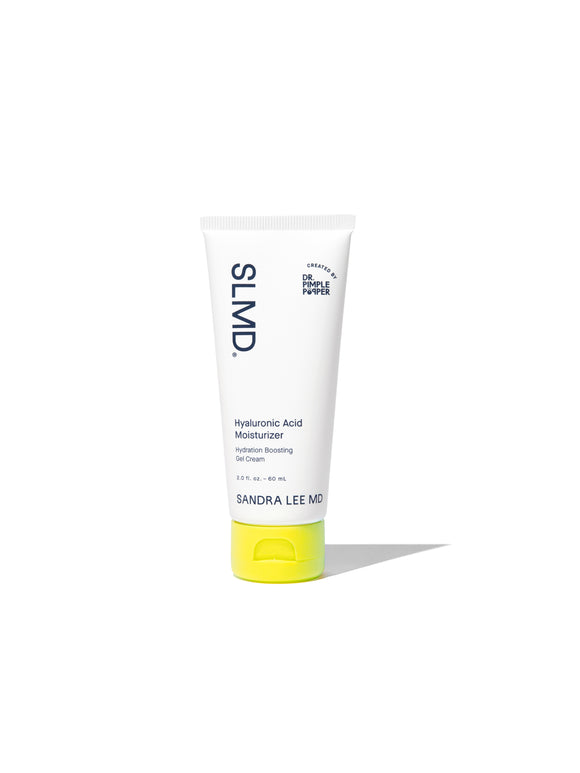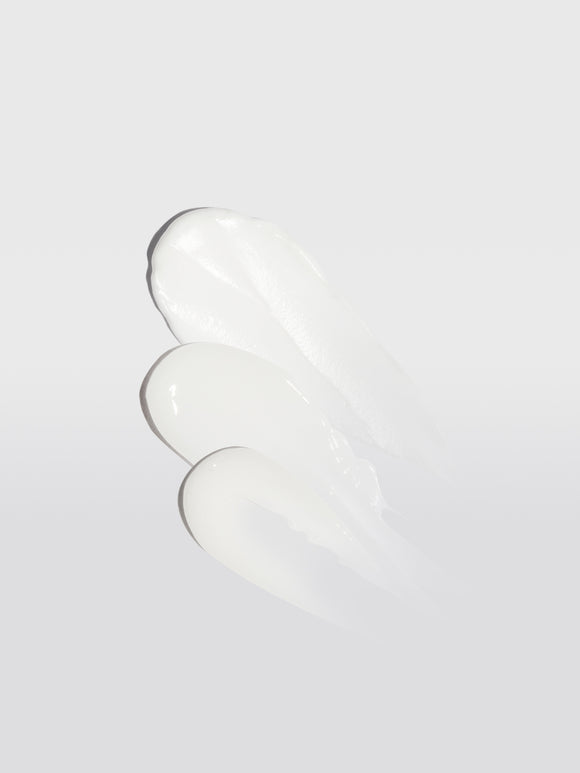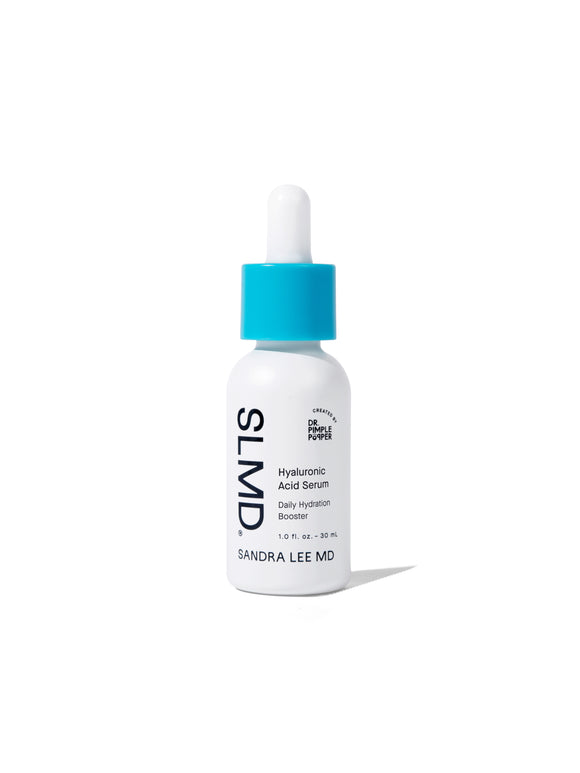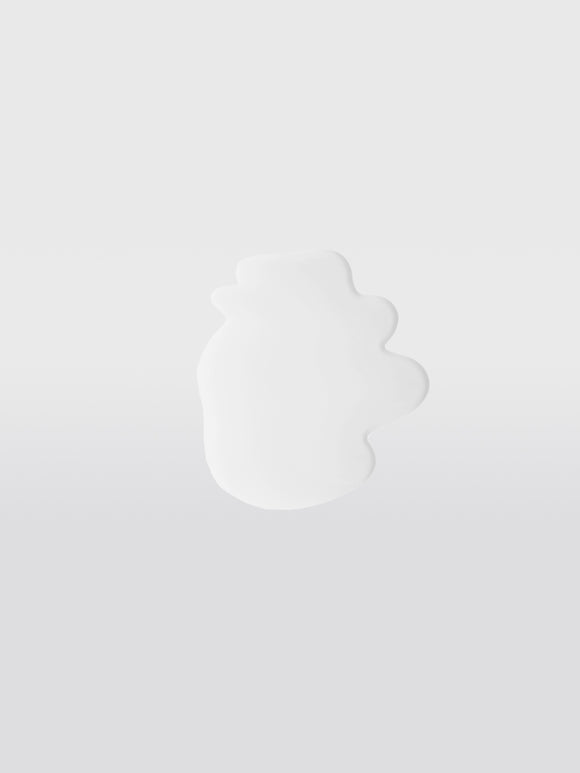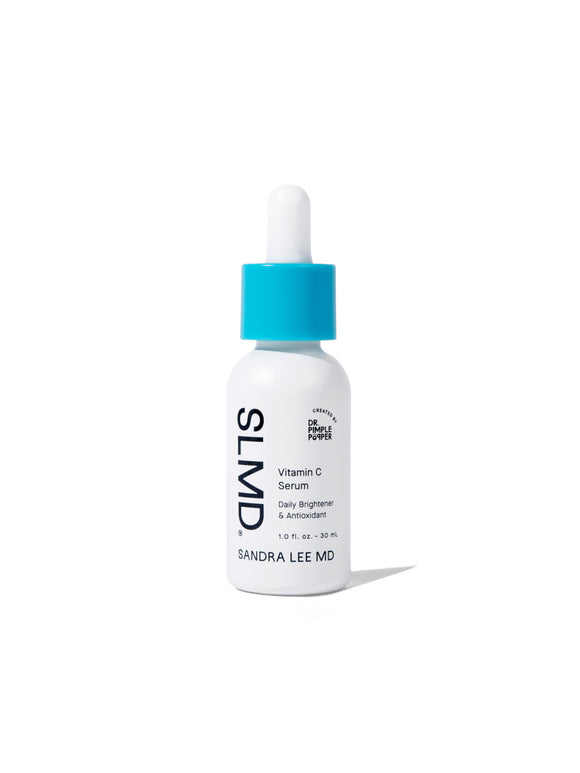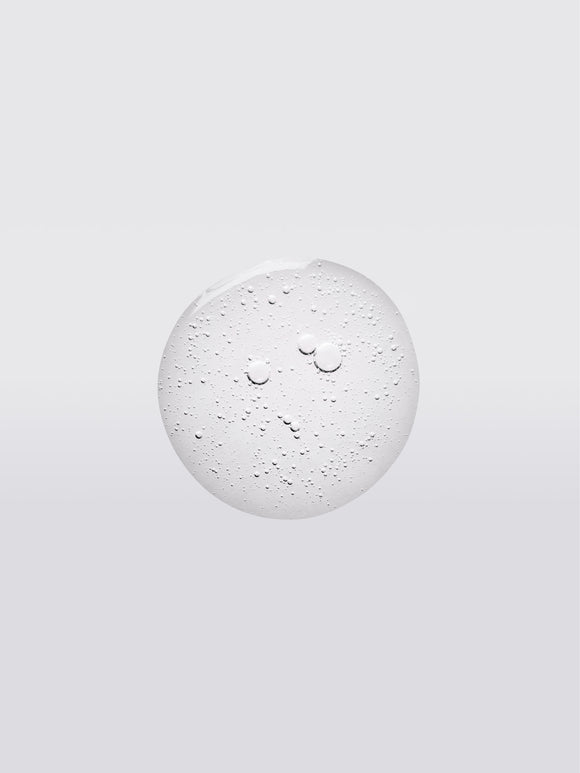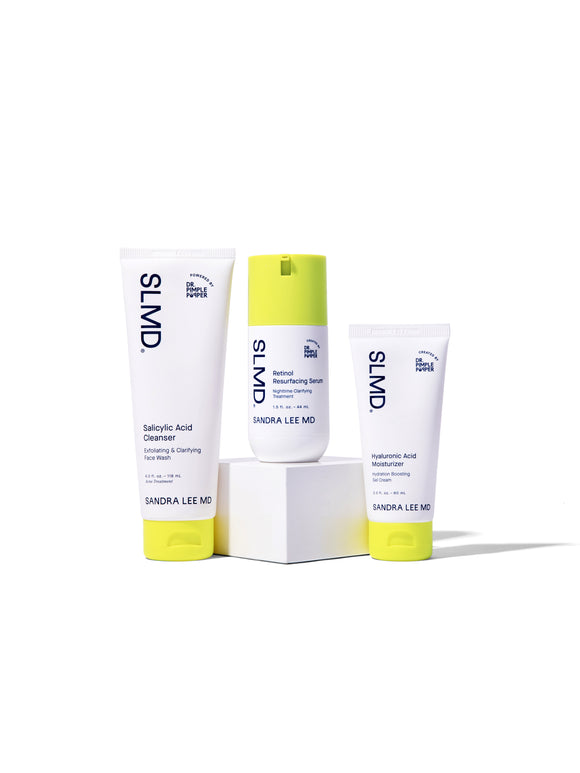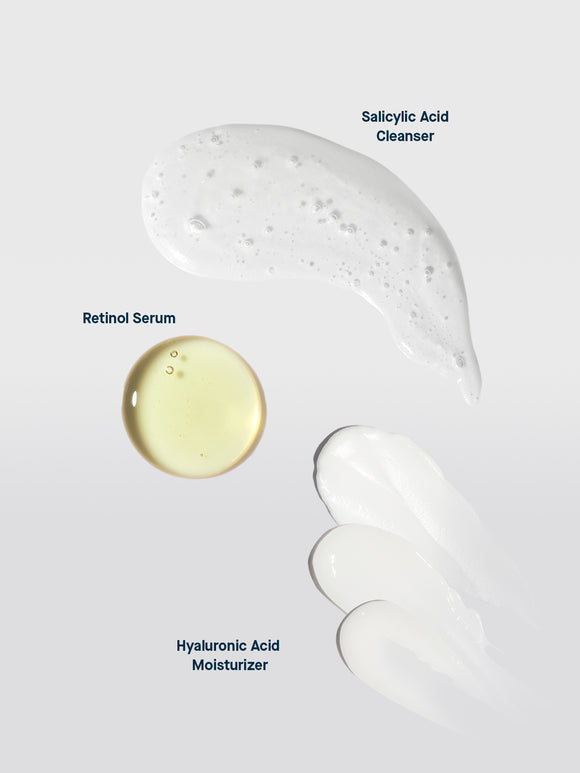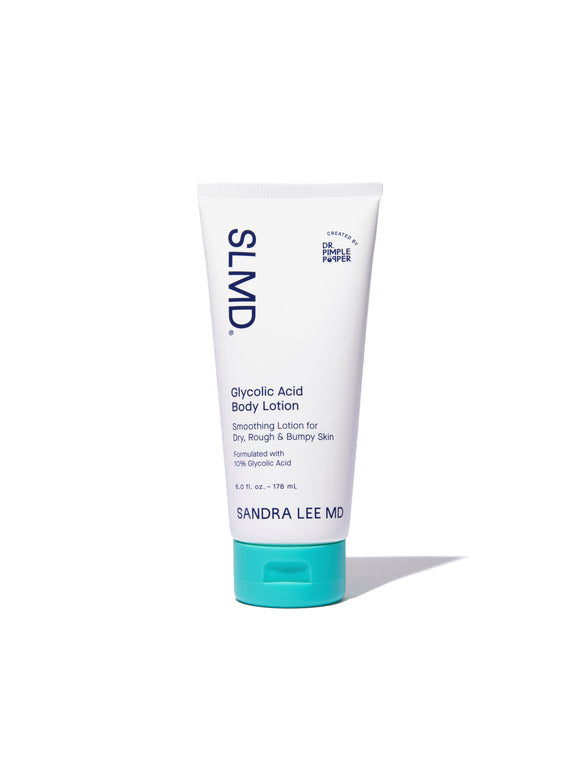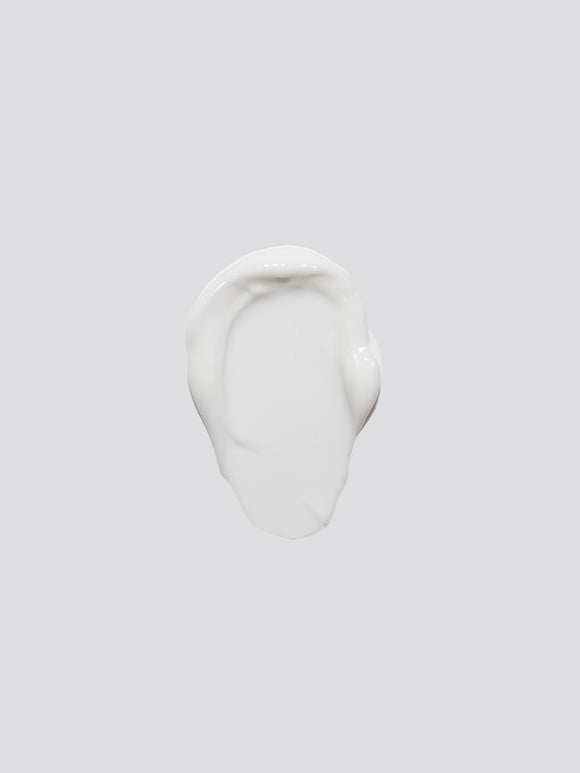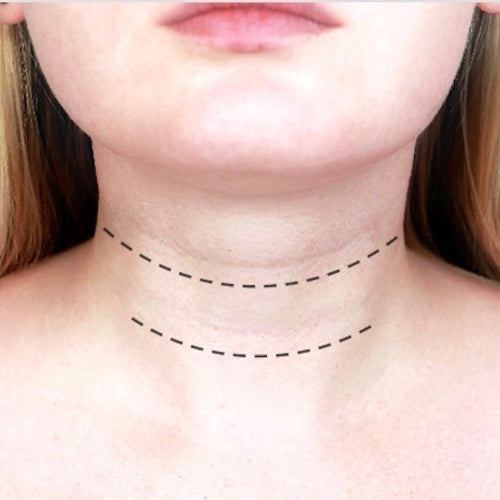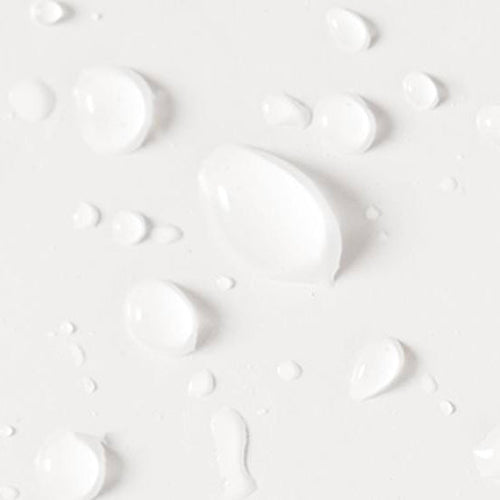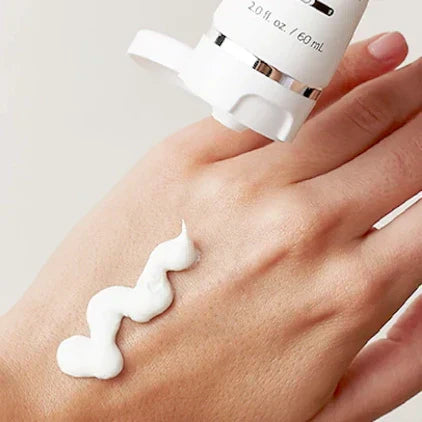
Ingredient Spotlight: Hyaluronic Acid
Learn why this humectant is one of Dr. Pimple Popper’s go-to ingredients for deep, radiant hydration.
Published:
4 minute read
Hyaluronic acid is a skin-plumping, hydration-boosting humectant and one of the most talked-about ingredients in skincare. We asked dermatologist Sandra Lee, MD (aka Dr. Pimple Popper) to explain what it is, how it works, and why she recommends it for nearly every skin type.
Fast Facts: hyaluronic acid benefits
- Draws water into the skin to maintain hydration
- Smooths and visibly plumps for healthy-looking skin
- Works for dry, oily, and acne-prone skin types
- Layers under a moisturizer to lock in hydration
Article Quick Links
What does hyaluronic acid do for your skin?
Also known as hyaluronan, hyaluronic acid is a naturally occurring sugar molecule found throughout the body — in the skin, eyes, and joints. It acts like a magnet for moisture, drawing and holding water to keep the skin supple and youthful.
As we age, our natural production of hyaluronic acid slows, contributing to dryness, fine lines, and a loss of elasticity. Replenishing it through skincare helps restore hydration, comfort, and bounce.
Hyaluronic acid benefits for skin
Hyaluronic acid (HA) is the foundation of deep hydration skincare, a hero humectant that attracts and retains moisture in the outer layers of skin. The less moisturized and hydrated your skin is, the more it tends to sag and lose its structure. When skin is well hydrated, it appears smoother, plumper, and naturally more radiant.
Because hyaluronic acid is gentle and non-comedogenic, it’s suitable for virtually every skin type, from dry and sensitive to oily and acne-prone. It also supports skin barrier repair, helping maintain the balance needed for strong, healthy-looking skin. For barrier support, pair humectants like HA with barrier lipids such as ceramides.
When that water gets pulled into your skin, it plumps and helps create that signature dewy glow that healthy, hydrated skin is known for.
Does hyaluronic acid really hold 1,000x its weight in water?
While you may have heard that hyaluronic acid can bind up to 1,000x its weight in water, that number is based more on lab research than real life. In skincare, factors like humidity, molecular size, and formulation all influence how much water the ingredient can actually attract and hold. Even so, hyaluronic acid remains one of the most effective humectants available — helping skin stay hydrated, plump, and balanced.
Dr. Pimple Popper's Hyaluronic Acid Product Picks
Understanding the different types of hyaluronic acid
Not all hyaluronic acid is the same. In skincare, you’ll often see different forms that work at different levels of the skin.
Here’s what to look for on skincare labels:
- Sodium hyaluronate: A smaller, more stable form of hyaluronic acid that penetrates deeper for lasting hydration.
- Hydrolyzed hyaluronic acid: A lightweight version that helps plump and smooth the skin’s surface.
- Crosslinked or multi-molecular HA: Formulas that blend different types for both surface and deep hydration.
Choosing products with a mix of these forms — like many dermatologist-developed formulas — can help boost both instant and long-term moisture.
Where to find hyaluronic acid in skincare
You’ll find hyaluronic acid in everything from lightweight serums to rich moisturizers and even in-office facial fillers. Look for products with smaller molecular weights, which can penetrate more deeply to hydrate multiple layers of skin.
Try: SLMD Hyaluronic Acid Serum, SLMD Hyaluronic Acid Moisturizer, SLMD Vitamin C Serum
Dermatologists also inject hyaluronic acid fillers to smooth fine lines and restore facial contours. Topical formulas can deliver many of the same hydration and plumping benefits at home.
How to use hyaluronic acid serum in your routine
Hyaluronic acid works best when applied after cleansing and before moisturizer. If you have dry or aging skin, adding a product rich in hyaluronic acid is one of the simplest ways to replenish moisture and improve suppleness.
It also layers well with powerful anti-aging ingredients like retinol and exfoliating acids. Applying a hydrating serum before and after active treatments helps minimize irritation and maintain the skin’s moisture balance.
- Layering hyaluronic acid with a moisturizer helps lock in hydration and keep the skin balanced throughout the day. Try: SLMD Hyaluronic Acid Serum followed by SLMD Daily Moisturizer with SPF 15.
- At night, pairing a hydrator with retinol supports skin renewal while minimizing dryness. Try: SLMD Retinol Resurfacing Serum followed by SLMD Hyaluronic Acid Moisturizer.
Hyaluronic acid vs moisturizer: do you need both?
Both hyaluronic acid and moisturizer play essential but different roles in keeping skin hydrated. Hyaluronic acid is a humectant, which means it pulls water into the skin. A moisturizer provides emollients and occlusives that lock in that hydration and prevent evaporation.
Even if you have oily or a acne-prone skin, using a moisturizer is vital to support your skin barrier and prevent dehydration.
To learn more about the three key ingredient types found in effective moisturizers and why they are necessary for every skin type, see our full guide: Why Moisturizer Is Important for Every Skin Type.
Hyaluronic acid FAQ
Q: Can you use hyaluronic acid with retinol?
A: Hyaluronic acid and retinol can be used together. Hyaluronic acid helps counter dryness and support comfort while retinol targets fine lines, tone, and texture; apply hyaluronic acid after cleansing, then layer retinol, or buffer by applying hyaluronic acid before and after as needed.
Q: Is hyaluronic acid good for acne-prone skin?
A: Hyaluronic acid is suitable for acne-prone skin because it hydrates without clogging pores and offsets the dryness and tightness that can follow acne treatments, helping maintain a healthier skin barrier.
Q: How do I get radiant skin with hyaluronic acid?
A: You can achieve a more radiant look by using hyaluronic acid consistently, sealing it with a moisturizer, and pairing it with gentle AHA or BHA exfoliation so light reflects evenly from a smooth, hydrated surface.

Dr. Lee's Last Word
Hyaluronic acid is one of my favorite hydrators because it draws water into the skin to restore smoothness and bounce. It’s gentle yet powerful, and a reliable choice whether your skin is dry, oily, or aging.



